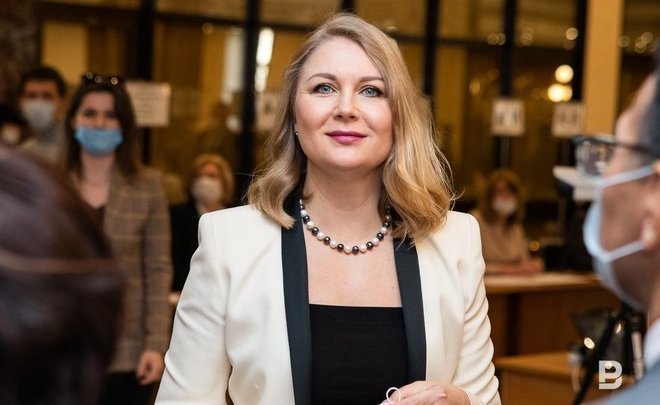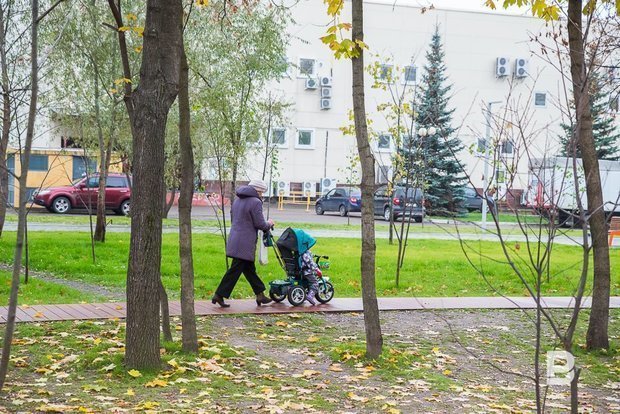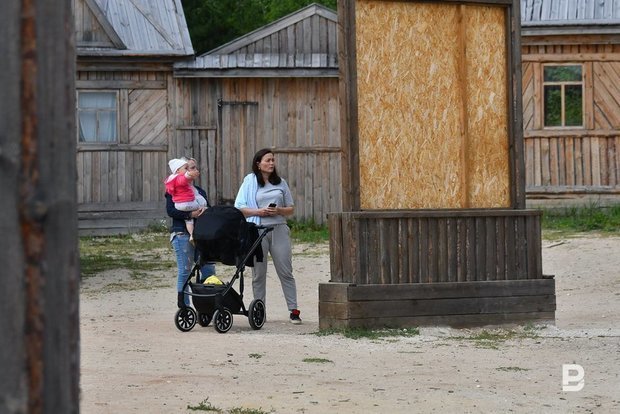Irina Volynets: ‘There is no positive stereotype in society that a large family is prestigious’

For two years in a row, an increase in the birth rate has been registered in Tatarstan in January compared to the same period of the previous year. For example, at the beginning of 2023, 2,938 children were born in the republic, which is by 2,2% more than in January 2022, which, by the way, last year turned out to be the only one of the 12 months when an increase was recorded. However, already in February, both then and now, there is again a decline. Irina Volynets, Commissioner for Children's Rights in Tatarstan, told Realnoe Vremya what the growth and fall of the birth rate in the region may depend on and also explained what measures need to be taken to stabilise this situation.
“There are prerequisites for an increase in the birth rate, and they are expressed in the form of allowances and benefits”
As Irina Volynets explained, the jump and fall in the birth rate in Tatarstan may depend on a number of factors, but it does not make sense to see this as a whole system. Today, the Republic is still the leader in this indicator among the regions of the Volga Federal District.
“If we talk about a decrease or increase in the birth rate, then it should be considered not monthly cycles, but years. These may simply be non-systemic reasons why there is an increase in some month and a decline in others. To make an accurate conclusion, we need to look at a particular year — where the birth rate increases and where the mortality rate is. In general, the average birth rate in Tatarstan is higher than in other regions of the Volga Federal District. This is due to that citizens from other regions come to the republic, and so the population increases. People tend to move to more prosperous cities and regions. It is mostly more active and young people who give birth to children who move," the children's ombudsman said.

Irina Volynets said that now there are all prerequisites for that the birth rate in the region will begin to grow, but the most important of them is still missing. We are talking about the prestige of a large family, which has not yet been widely spread in society.
“There are prerequisites for an increase in the birth rate, and they are expressed in the form of allowances and benefits. We are talking about a single benefit, which is paid from January 1, 2023 on the principle of a single window. Therefore, yes, there are prerequisites, but here one cannot be guided solely by the material factor. There are also mental reasons. When a large family becomes really fashionable, then we will definitely expect an increase in the birth rate. Now, unfortunately, there is no positive stereotype in public opinion that a large family is prestigious," she explained.
The children's ombudsman believes that it is necessary to carry out large-scale work to raise the prestige and status of large families. First of all, according to her, it is the state who should be the initiator and engine of this activity.
“It is also very important that the federal law on legal guarantees and the status of a large family has not yet been adopted, which would consolidate support measures in the country and add confidence to those who want a large family. The cultural policy of the state should be directed in the same direction. It also acts as a customer of some works of culture, for example, content on television, outdoor advertising, books, films and more. Here in the part that the state pays for, emphasis should be placed on families with children," she said.
“There should be more indirect support measures, not direct ones”
Speaking about the support measures, Irina Volynets noted that to a greater extent they are of a direct or material nature. That is, when a certain amount is allocated to citizens, and they already dispose of it as they want. As the commissioner for children's rights is sure, young families need assistance in a different format, for example, support with education or housing.
“Plus, it is necessary to strengthen state support measures. This is, for example, the provision of social housing for large families. Last year, I proposed to create a state housing fund that would provide housing for large families. This will not be done as property, but for social hiring, which comes at a symbolic price. At least people will have a place to live, place children and where to give birth to new ones. Now, after all, for many, the housing issue is an obstacle to the birth of children," she said.

Volynets is sure that “cash in hand” does not always help the population. According to her, support should also create new spaces and playgrounds where children will be engaged and educated:
“There should be more indirect support measures, not direct ones. Direct means payments and allowances, and indirect means the provision of housing, higher education, sports clubs, clubs and school uniforms. This is what the money will be spent on, but it cannot be abused. When someone is simply given money on hand, then for them it may be a lot, or it may be irrelevant or little. Someone may also spend not on what they were intended for. It is the creation of infrastructure that allows people to be sure that the child will study at the expense of the state, live in an apartment and his parents will not need to take out a loan to send them to a children's camp.”
As the children's ombudsman stressed, the state should bear all the costs of supporting families. And then, along with changes in the status of large citizens, the birth rate will begin to grow.
“If people are needed, then it means that these expenses should be provided for by the state at its expense. They gave, for example, 10 thousand rubles. For some it's a lot of money, and for some it's pennies. But one thing should be equal for all people — when they send a child to school, they should know that they will be fed there. Therefore, we need indirect support measures, solving the housing issue, increasing the prestige of a family with children, and the adoption of a federal law on legal guarantees and the status of a large family," she concluded.
2,9 thousand children were born in Tatarstan in the first month of 2023
According to official statistics, 2,938 children were born in Tatarstan in January 2023 — by 2,2% more than in the same month last year, when there were 2,875. Already on New Year's night, 30 babies were born, of which 19 were girls. In Kazan, the first child — a boy — was born in the first minute of the year — at 00:01 am.
A similar situation was observed in 2022 — in January, an increase in the birth rate was recorded (+1,4% compared to January 2021). In the remaining 11 months, the indicator decreased in relation to the same period of the previous year. For example, in June, the birth rate fell by 15,4% compared to the same month in 2021.

At the same time, it should be noted that the birth rate in January 2023 increased in half of the regions of the Volga Federal District. At the same time, the highest growth was registered in Ulyanovsk Oblast — by 6,1% compared to the first month of 2022. However, despite these values, almost four times fewer children were born there than in Tatarstan — 752.
In February 2023, 2,697 children were born in the republic. There was a decrease in the birth rate again — by 4,4% compared to February last year.